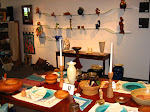The Guardian reports that soaring commodity prices for coffee, tea and cocoa have led some to question the long-term viability of the fair trade model.
Coffee, tea and cocoa prices have soared to multi-year highs in recent months as turmoil in stock markets has sent investors in search of safe places to put their cash.
This situation has fueled criticisms of the fair trade model from free market-oriented institutes, such as the Cato Institute in Washington and the Adam Smith Institute in London.
The economic impact of rising prices is at this point mostly hypothetical, however, since fair trade commerce has grown through 2007 at double-digit rates (see previous post).
Ian Bretman,deputy director of the London-based Fairtrade Foundation, admitted that the current boom might jeopardise the system.
But he added that the open market exaggerated price volatility and would not affect the fair trade model which offered a lot more to impoverished farmers. "Because there had been such a long period of low commodity prices, people have tended to assume that that is the only thing that fair trade does, but it does a lot more," he said.
He said the system offered other benefits such as an efficient supply chain between farms and ports and advance payments in time of need, which farmers should see as a long-term benefit.
We might add that price increases due to shifting funds out of falling stock markets seem particularly liable to sudden reversals.
And, of course, fair trade products include a considerably more diverse range of items than just coffee, tea and chocolate, as the inventory at Fair World Marketplace shows.



0 comments:
Post a Comment